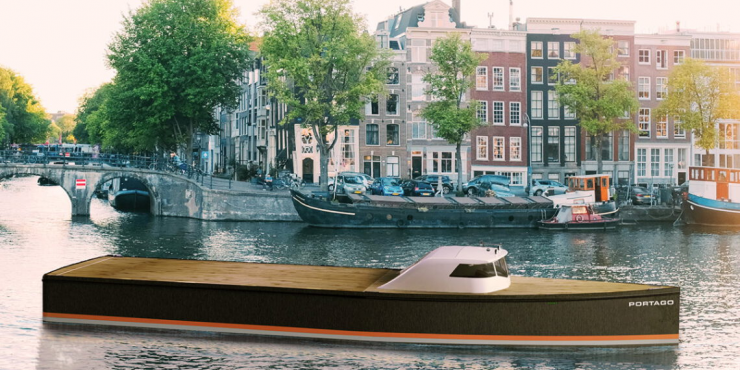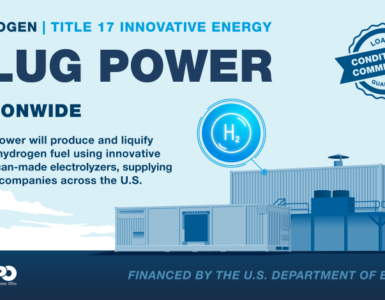Amsterdam launches Hydrogen Hub to kickstart a new economy.
[Silicon Canals] Getting rid of fossil fuels is easier said than done. In the end, we all want our phones to be charged, our cars to be driving and our factories to keep running. With electricity alone, that will be tough, hydrogen offers a solution.To make the switch, some massive steps need to be taken. The first one is to get everyone to work together. That is why the greater area of Amsterdam has launched a Hydrogen Hub to unite all stakeholders and work towards the same goal: kickstart a revolution.
Hydrogen Hub Amsterdam launched
🔥 What about we co-host a webinar? Let's educate, captivate, and convert the hydrogen economy!
Hydrogen Central is the global go-to online magazine for the hydrogen economy, we can help you host impactful webinars that become a global reference on your topic and are an evergreen source of leads. Click here to request more details
The hub involves The Port of Amsterdam, Amsterdam Airport Schiphol, energy company Vattenfall and the municipalities of Amsterdam and Zaanstad. The collaboration in the hub aims for the Amsterdam Area and North Sea Canal Area to achieve large-scale transition and import and export of hydrogen by 2050.
Wilmar van Grondelle is overseeing the hydrogen economy and transition to renewable energies for the city of Amsterdam. To him, the rise of hydrogen is inevitable, likening it to the rise of natural gas usage in the ’60s.
“It’s going to be a revolution again, this is going to happen. There already have been massive investments and several wind farms are planned for the future. Hydrogen fits the city of Amsterdam really well.”
‘Ideal position to be a leader’
Hydrogen Hubs have popped up in many places around the world. According to Van Grondelle, Amsterdam is ideally positioned to play a significant role in the fast transition to hydrogen usage. It has its harbour, which currently functions as one of the largest ports for fuel transports to the hinterland, like Germany.
Schiphol airport is one of the busiest aviation hubs in Europe. Further west, the North Sea Canal connects Amsterdam directly to the Tata Steel factories in IJmuiden. And offshore, countless windmills pop up in the North Sea to fuel the transition to clean energy.
There is also an intrinsic need to clean up the act. Last year, Amsterdam presented its roadmap that will lead the way to a climate-neutral city in 2050. With a large part of the emissions coming from the industries surrounding the city, that’s where the main focus lies.
Van Grondelle:
The port is getting a lot of revenue from shipping fossil fuels, but they want to become a green harbour.
“Also with Schiphol Airport in the vicinity, Amsterdam can be an ideal hub for sustainable fuels. Heavy transport is likely moving to hydrogen, whereas smaller mobility solutions will consider hydrogen as an alternative to electricity.”
Applications for hydrogen
Transportation is not the only application for hydrogen, says Van Grondelle. Hydrogen solutions can also serve as balancers for the existing networks. “Batteries are still relatively expensive and complicated. But the electricity network is about to be overloaded. Hydrogen-powered solutions can serve as buffers.”
Another application is what Van Grondelle calls ‘green chemistry’, where hydrogen is used to create carbon molecules that can serve as building blocks for other chemical substances. Hydrogen can also play an important role in the production of fertilizer and the food industry.
Too early for startups?
There is, in other words, plenty of room for innovation. Van Grondelle concedes that it is fairly early in the transition. Startups with bright ideas looking to get in on the ground floor might find themselves waiting for others to jumpstart the revolution.
“It’s still very early”, says Van Grondelle. To produce hydrogen, you need a lot of energy.” Wind farms in the North Sea, not far from Amsterdam, will be available to produce that energy. But it will take time until many of the planned expansions materialise.
In the coming three years, another batch of windmills will be built, good for an additional 3,5 gigawatts. Van Grondelle says the capacity will scale to 60 gigawatts eventually.

Once that energy is available, there need to be companies producing hydrogen. “The technology to scale up the production is currently in the hands of several large companies. Names like Shell and Akzo Nobel.” They are working on it, but until they’ve scaled up innovation will be limited. That doesn’t mean nothing is happening in that area. Several startups have already taken a headstart on the revolution.
Pioneer companies using hydrogen
The startup Portago Marine, for instance, is planning to deploy a cargo boat to the Amsterdam Canals. The boat is fuelled by a hybrid battery and hydrogen fuel cell and can supply the inner cities without emitting anything harmful.
Van Grondelle also mentions Synkero, a project development startup that works together with the Port of Amsterdam, Schiphol Airport, SkyNRG and KLM airlines to create a synthetic kerosene from hydrogen. The startup is currently building a hydrogen facility in the ports.
Van Grondelle: “A lot of innovation is happening in small parts of the whole chain. Innovators creating better parts for the electrolysers that produce hydrogen. Or creating ways to transport hydrogen. These innovations are not yet acting on the foreground a lot, but they are very important.”
However, the true boom of hydrogen innovation by startups can be expected once the framework conditions for hydrogen production are created, says Van Grondelle. Something the Hydrogen Hub is working on. The collaboration is also in close contact with the colleges and schools in Amsterdam.
Amcel, a joint initiative of the Amsterdam electrochemistry community initiated by the University of Amsterdam, is not part of the hub but has a seat at the table. Colleges and MBOs in the city will also be involved. Van Grondelle: “Sustainability and economic development go hand in hand. This is also an issue of job creation and sharing knowledge.”
Kickstarting a new economy
Before any of that happens though, there needs to be sufficient hydrogen production. Van Grondelle thinks that could come faster than we think. “Amsterdam has Tata Steel in the metropolitan area. They need to change.”
He is referring to the bad rep the steelworks gets for its harmful emission covering the town of IJmuiden. “They are transitioning their factory to hydrogen use, for instance, to produce CO2-free steel.”
“Once they’ve done that, they’ll say: ‘we did our part, now we need sufficient capacity for the next couple of years.’ That will put pressure on the other parties and will likely be an enormous driver for hydrogen production in the area. It will probably kickstart an entirely new economy.” Thanks for staying up to date with Hydrogen Central.
Check out the source article in the following link
“This is going to happen”: Amsterdam launches Hydrogen Hub to kickstart a new economy, November 11, 2021








